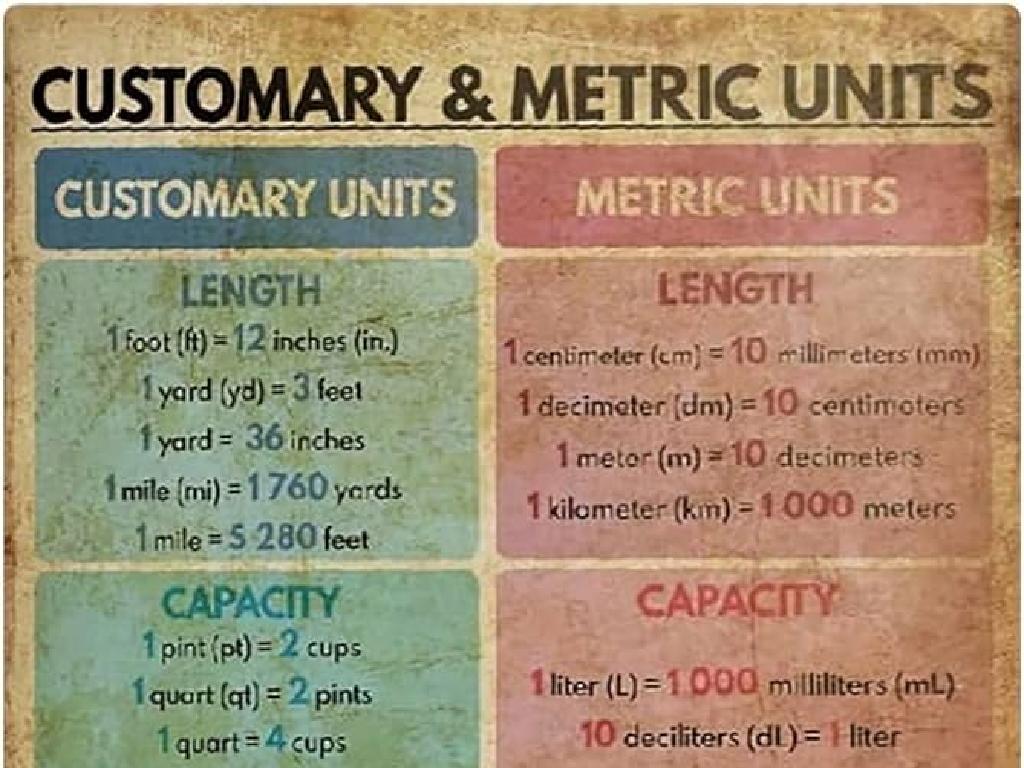Words With -Less
Subject: Language arts
Grade: Fifth grade
Topic: Prefixes And Suffixes
Please LOG IN to download the presentation. Access is available to registered users only.
View More Content
Exploring Prefixes and Suffixes
– Building blocks of words
– Defining prefixes and suffixes
– Prefixes come before the root word, suffixes after
– Examples of common prefixes
– ‘un-‘, ‘re-‘, ‘pre-‘ are prefixes that change a word s meaning
– Examples of common suffixes
– ‘-ful’, ‘-less’, ‘-ness’ are suffixes that modify a word s meaning
|
This slide introduces the concept of prefixes and suffixes, which are essential components of many English words. Understanding these can help students decode unfamiliar vocabulary and enhance their spelling skills. Emphasize that prefixes are added to the beginning of root words to alter their meaning, while suffixes are added to the end. Provide clear examples for each, such as ‘unhappy’ (where ‘un-‘ means not), ‘redo’ (where ‘re-‘ means again), ‘preview’ (where ‘pre-‘ means before), ‘hopeful’ (where ‘-ful’ means full of), ‘fearless’ (where ‘-less’ means without), and ‘happiness’ (where ‘-ness’ means the state of). Encourage students to think of additional examples and discuss how the meaning of the root word changes when different prefixes and suffixes are applied.
Understanding ‘-less’: A Suffix Meaning ‘Without’
– ‘-less’ means ‘without’
– ‘fearless’ = without fear
– Example: A ‘fearless’ person is not afraid
– ‘hopeless’ = without hope
– Example: A ‘hopeless’ situation has no hope
– ‘-less’ alters word meanings
– It turns a noun into an adjective showing absence
|
The suffix ‘-less’ is added to the end of a noun to form an adjective, indicating that the person or thing does not possess the quality of the noun. For example, ‘fearless’ describes someone who is not affected by fear, and ‘hopeless’ describes a situation where there is no expectation of positive outcomes. Encourage students to think of other words that end with ‘-less’ and discuss how the meaning of the original word changes once the suffix is added. This will help them understand how suffixes can alter the meaning of words and how they can use this knowledge to enhance their vocabulary.
Crafting Words with ‘-less’
– Start with a base word
– Add ‘-less’ to form a new word
– Example: ‘care’ to ‘careless’
– ‘Careless’ means without care
– Activity: Create your own ‘-less’ words
– Think of words and share what they mean without ‘-less’
|
This slide introduces the concept of using the suffix ‘-less’ to create new words that mean ‘without’ the base word. Start by explaining that a base word can stand alone and has its own meaning. When we add ‘-less’, it takes away the original meaning of the word. For example, ‘care’ means to look after someone, but ‘careless’ means without care or not giving attention. During the activity, encourage students to think creatively and come up with words that can have ‘-less’ added to them, such as ‘fearless’ or ‘hopeless’. Discuss the new meanings these words take on. This activity will help students understand how suffixes can change word meanings and enhance their vocabulary.
Using ‘-less’ Words in Sentences
– Understanding ‘-less’ words
– Words ending in ‘-less’ mean ‘without’
– Examples in sentences
– ‘Careless’ means without care
– Class activity: Create sentences
– Use ‘-less’ words in your own sentences
– Share and discuss with the class
– We’ll review sentences as a class
|
This slide introduces the concept of ‘-less’ words, which are adjectives that describe the absence of something, such as ‘careless’ meaning without care. Start by explaining how ‘-less’ changes the meaning of words and fits into sentences. Provide clear examples, like ‘The careless mistake caused a lot of trouble.’ For the class activity, instruct students to write sentences using ‘-less’ words to ensure they understand how these words function in context. Encourage creativity and have students share their sentences with the class for discussion. This will help reinforce their understanding and allow for peer learning.
Exploring ‘-less’ Words in Literature
– Identify ‘-less’ words in texts
– Words like ‘fearless’ or ‘endless’ found in stories
– Comprehend ‘-less’ words in context
– Understand how ‘-less’ changes the meaning of words
– Group activity: Paragraph investigation
– Work together to find ‘-less’ words in a given paragraph
|
This slide introduces students to the concept of ‘-less’ words within the context of literature. Begin by explaining that ‘-less’ is a suffix that means ‘without’ and changes the meaning of the word it is attached to. For example, ‘fearless’ means without fear. Encourage students to look for ‘-less’ words as they read books or stories, and discuss how these words help describe characters, settings, or actions. The group activity involves students working together to find and discuss ‘-less’ words in a paragraph provided by the teacher. This collaborative exercise will help reinforce their understanding of the suffix and its impact on word meaning. Provide a paragraph that contains several ‘-less’ words and guide the students through the activity, ensuring each group understands the task.
The Power of ‘-less’: Changing Word Meanings
– ‘-less’ alters sentence tone
– ‘Careless’ implies a lack of care or attention
– Emotional impact of ‘-less’
– ‘Heartless’ feels cold, ‘fearless’ feels brave
– ‘-less’ affects word interpretation
– Adding ‘-less’ often gives a negative meaning
– Examples: ‘heartless’ vs ‘fearless’
– Compare ‘helpful’ to ‘helpless’ in sentences
|
This slide aims to explore the suffix ‘-less’ and its significant role in altering the meaning and tone of words. Students will learn how ‘-less’ can transform a word to express the absence of something, often leading to a negative connotation. For instance, ‘heartless’ suggests a lack of compassion, while ‘fearless’ implies bravery. It’s crucial to discuss the emotional weight words can carry when this suffix is applied. Encourage students to think about how the addition of ‘-less’ changes their interpretation of a word and to consider the context in which such words might be used. Provide examples and ask students to create sentences using ‘-less’ words to illustrate the change in meaning.
Class Activity: ‘-less’ Word Creation
– Split into groups for a challenge
– Create a list of ‘-less’ words
– Think of words like ‘fearless’, ‘endless’, ‘hopeless’
– Use words in creative sentences
– ‘The fearless cat climbed the tall tree’
– Share your best sentences
|
This activity is designed to help students understand and practice using words with the suffix ‘-less’, which means ‘without’. Have the class split into small groups and brainstorm a list of words that end with ‘-less’. Then, each group should create sentences using their words, focusing on creativity and context. Encourage them to think about what the word would mean without the ‘-less’ suffix to deepen their understanding. Afterward, invite groups to share their favorite sentences with the class. This will not only reinforce their understanding of the suffix but also enhance their teamwork and presentation skills. Possible words include ‘restless’, ‘tireless’, ‘flawless’, etc. For sentences, they might say ‘The tireless runner didn’t stop until the race was over’ or ‘In a flawless performance, the magician amazed the audience’.
Wrapping Up: The Power of ‘-less’
– Recap: Understanding ‘-less’
– ‘-less’ means without, e.g., ‘fearless’ means without fear
– Significance of word parts
– Knowing word parts helps decipher unknown words
– Homework: Craft a ‘-less’ story
– Write a creative story including 10 words ending in ‘-less’
– Share stories next class
– Be prepared to present your story to the class
|
As we conclude today’s lesson, remind students of the meaning of the suffix ‘-less’ and its role in altering the meaning of words to indicate absence. Emphasize the importance of understanding different word parts, like prefixes and suffixes, as it aids in vocabulary development and comprehension of new words. For homework, students are tasked with writing a short story that incorporates at least 10 words ending with ‘-less’. This activity will help reinforce their understanding of the suffix and encourage creativity. In the next class, students will have the opportunity to share their stories, which will not only enhance their writing skills but also their public speaking and confidence.





